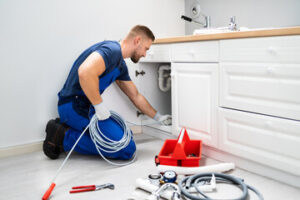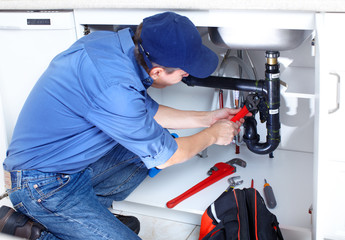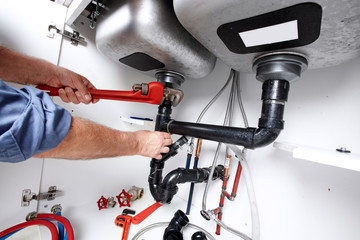The Neighborhood Plumber installs and repairs piping, fixtures, and appliances such as sinks, toilets, and water heaters. They also inspect plumbing systems to ensure they meet building codes and standards.

This career requires good customer service skills to communicate with clients, provide recommendations, and address their concerns. It also demands physical fitness to perform tasks like climbing and crawling in tight spaces.
Plumbing inspections are a valuable preventative tool to identify problems, check functionality, and promote safety and efficiency. A professional plumber will take a look at everything in and around your home’s plumbing system to make sure things are up to code. From inspecting water heaters to assessing septic tanks, a plumbing inspection can help you keep your home and family safe from costly problems.
A comprehensive plumbing inspection will cover all areas where water runs in and out of your home. This includes checking sinks, tubs, toilets, and showers to make sure they are functioning properly. Inspectors will also test the pressure of your home’s water and ensure pipes are properly supported so they won’t freeze during cold temperatures. The plumbing professionals will also take the time to examine all the drains, traps, and sewer lines in your home to make sure they are free of blockages and clogs. This is when they’ll use drain cameras to get a closer look at the interior of your pipes.
Water heaters are a vital component of the plumbing system, providing hot water for bathing and washing dishes. During a plumbing inspection, the inspector will assess whether your water heater is in good condition and that it has proper ventilation and insulation to avoid leaks and other issues. Inspectors will also check the pilot light and gas connections, as well as the temperature and pressure relief valves.
Getting regular whole-house plumbing inspections can help you stay on top of your plumbing. It can also save you money, as your plumber can catch small problems before they deteriorate into more significant and expensive ones. In addition, a whole-house inspection can give you a detailed report on the status of your plumbing system so that you can plan for any upgrades in the future. For example, if you’re planning on buying a new home, a plumbing inspection will let you know what state your plumbing is in and whether any repairs are needed before you make the purchase. This information can help you negotiate a better price and avoid surprises down the road.
Plumbing Repair
Plumbing repairs are often necessary to fix issues with faucets, drains, showers, water heaters, and more. It is important to know how to properly repair these items to avoid costly plumbing emergencies down the road. Whether you are a homeowner looking to be more self-sufficient around the house, or you are simply tired of calling the plumber every time something goes wrong with your home’s plumbing, there are some basic plumbing repairs that everyone should be able to do.
The first step in any plumbing repair project is to shut off the water supply. This can be done by turning off the main water valve located underneath sinks or near water heaters and appliances. After the water has been turned off, it is also a good idea to turn on the hot and cold water taps to flush out any remaining water in the pipes.
Next, identify any visible signs of leaks or wear and tear on fixtures. This includes rust, water stains, or mold. Leaks can lead to serious water damage and should be addressed as soon as possible. Leaking toilets, dripping faucets, and overflowing bathtubs are all common indications of leaky plumbing fixtures. In some cases, a simple repair may be enough, but in others, replacement parts or even entire fixtures will need to be replaced.
Other common plumbing problems include low water pressure, frequent clogs, and bad smells coming from drains. These issues can be prevented with regular maintenance and by being mindful of what is placed in and around your home’s plumbing system. For example, never pour grease or oil down a drain and always use biodegradable cleaners when cleaning drainpipes or garbage disposals.
It is also a good idea to have your plumbing system inspected on a regular basis. This can help prevent minor issues from becoming major problems, and it can also save you money on your energy bills by ensuring that all of your plumbing components are functioning properly. A professional plumber will have the tools and knowledge to diagnose any issues and provide the appropriate solutions.
Plumbing Maintenance
Plumbing maintenance is the process of regularly inspecting, cleaning, and repairing pipes and fixtures to prevent problems before they occur. It is an important part of a property owner’s overall management strategy for maintaining the quality of water and performance of plumbing components in commercial settings.
Over time, the normal wear and tear of using a plumbing system will cause leaks, clogs, and other issues. Without regular maintenance, these problems can lead to expensive and disruptive emergencies. By hiring professional plumbers for routine inspections and cleanings, you can avoid major issues and keep your home or business running smoothly.
When left unaddressed, small plumbing issues can grow into large, costly problems that disrupt daily life or put your family or employees at risk. From clogged drains to leaking pipes, these problems can be difficult and stressful to deal with. However, when these issues are proactively addressed through professional maintenance services, such as drain cleaning and pipe inspections, you can avoid unexpected plumbing disasters that can damage your home or business and result in significant costs.
In addition to detecting and addressing potential plumbing problems, maintaining your pipes will also help them last longer. Leaks, clogs, and other minor problems can weaken your pipes over time, leading to their eventual failure. By having these issues proactively addressed through preventative maintenance, such as routine inspections and drain cleaning, you can extend the lifespan of your pipes and save money on costly repairs down the road.
A well-structured checklist helps to ensure that all aspects of a plumbing system’s upkeep are covered. This includes checking for leaks, identifying water pressure issues, and testing toilets and faucets for proper operation. It also includes regularly cleaning your drains to remove buildup and ensuring that all shut-off valves are easily accessible in the event of an emergency.
Other important maintenance tasks include looking for signs of rust or corrosion on exposed pipes, and ensuring that the gas line to your water heater is in good working condition. Finally, it’s a good idea to learn the location of your main water shut-off valve in case of an emergency.
Plumbing Installation
Plumbing involves the installation and repair of pipes, fixtures, appliances, and other components that supply water, drain waste, and vent gases throughout a building. The trade requires knowledge of a wide range of skills, as plumbers must be familiar with construction practices, building codes, and regulations. They also must be able to read blueprints and understand how different systems work together. A plumber may specialize in residential or commercial plumbing.
In residential settings, a plumber installs and connects pipes for sinks, toilets, tubs, showers, and other fixtures. They may also install water heaters and washer/dryer hookups. When installing new fixtures, plumbers ensure they fit properly and meet local codes and regulations. They also test for leaks and other issues before finishing the job.
For new construction, a plumber works with the building’s architect and engineer to design the plumbing system. They plan out the piping routes, including where each fixture will be located, and mark where the pipes will go underground. Before beginning the rough-in phase, a plumber must walk through the framed structure with the builder to verify all product specifications and cabinet layouts are accurate.
During the rough-in plumbing process, a plumber installs piping underneath the foundation of a building. This can be dangerous, as they must make sure the pipes are properly fitted and sealed to prevent water leaks and other problems down the line. They also must ensure the piping meets local code requirements and is ready for drywall and flooring.
Residential plumbers can also install gas lines for fireplaces and outdoor kitchens. This requires the use of specialized tools and equipment, as well as knowledge of gas pipe installation and safety. Plumbers who specialize in commercial plumbing work have additional training and experience in working with larger-scale piping networks and more complex fixtures. They also have a greater understanding of the latest plumbing technologies and materials. This allows them to provide more comprehensive services for their clients. They can also handle emergency repairs for commercial and industrial buildings.



